Trappe Surname Ancestry ResultsOur indexes 1000-1999 include entries for the spelling 'trappe'. In the period you have requested, we have the following 21 records (displaying 11 to 20): Buy all | | | Get all 21 records to view, to save and print for £98.00 |
These sample scans are from the original record. You will get scans of the full pages or articles where the surname you searched for has been found. Your web browser may prevent the sample windows from opening; in this case please change your browser settings to allow pop-up windows from this site. Surrey Sessions
(1661-1663)
Surrey Sessions Rolls and Order Books. These are abstracts of sessional orders, minutes of criminal cases, memoranda and other entries of record taken from the Order Books from October 1661 to January 1663, inclusive, and the Sessions Rolls for October 1661, January 1662, April 1662, July 1662, October 1662 and January 1663.TRAPPE. Cost: £4.00.  | Sample scan, click to enlarge

| Official Papers
(1675-1676)
The State Papers Domestic cover all manner of business relating to Britain, Ireland and the colonies, conducted in the office of the Secretary of State as well as other miscellaneous records. Includes lists of passes to travel abroad.
TRAPPE. Cost: £4.00.  | Sample scan, click to enlarge
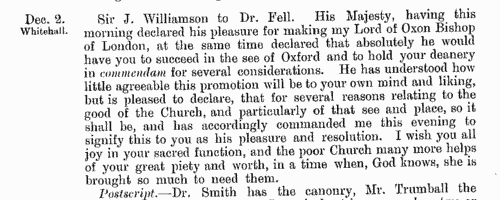
| Testators and legatees in London
(1358-1688)
The Court of Husting of the city of London sat (usually on a Monday) each week: among its functions was the enrolment of deeds and wills relating to citizens of London. In their strictest technical sense the terms 'will' and 'devise' are appropriate to real estate, and the terms 'testament', 'bequest' and 'legacy' to personal estate, but this distinction is lost sight of in ordinary usage. This calendar of wills proved and enrolled in the Court of Husting was edited by Reginald R. Sharpe, records clerk in the office of the Town Clerk of the City of London, and printed by order of the corporation in 1890. The date of the court is given in italics, with the year in bold in the margin. The testator's name is given in capitals (surname first, in bold), and then a brief listing of substantial bequests, with the names of legatees, and then the date of making of the will, and reference. The bulk of the wills in this volume are from before 1600. TRAPPE. Cost: £4.00.  | Sample scan, click to enlarge

| Correspondence of Matthew Prior
(1685-1721)
Matthew Prior was secretary to the British embassy and minister ad interim at The Hague 1693 to 1697, secretary to the embassy at the Congress of Ryswick in 1697, and secretary to the embassy and minister ad interim at Paris 1698 to 1699. His papers survived among the archives of the Marquis of Bath at Longleat, and were edited for the Historical Manuscripts Commission by J. J. Cartwright, A. Maxwell-Lyte and J. M. Rigg, and published in 1909. The volume concludes with a journal and memoirs relating to the Treaty of Ryswick. Most of the correspondence selected deals with the Anglo-Dutch and Anglo-French diplomacy of the period.TRAPPE. Cost: £4.00.  | Sample scan, click to enlarge
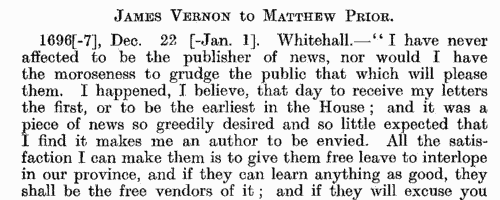
|  Masters and Apprentices
(1726) Masters and Apprentices
(1726)
Apprenticeship indentures and clerks' articles were subject to a 6d or 12d per pound stamp duty: the registers of the payments usually give the master's trade, address, and occupation, and the apprentice's father's name and address, as well as details of the date and length of the apprenticeship. 3 January to 31 December 1726TRAPPE. Cost: £8.00.  | Sample scan, click to enlarge

| Victoria Intestates
(1860)
The probate courts of the Australian colonies furnished returns of estates of deceased intestates, giving full name, colonial residence, supposed British or foreign residence of family (often unknown, or left blank), amount of the estate and how much had been disbursed and how. The date of death is often stated, and if by accident, suicide or crime. Names were carried forward from return to return until the estate was expended or exhausted. TRAPPE. Cost: £6.00.  | Sample scan, click to enlarge

| Missing Next-of-Kin and Heirs-at-Law
(1890)
The Unclaimed Money Registry and Next-of-Kin Advertisement Office of F. H. Dougal & Co., on the Strand in London, published a comprehensive 'Index to Advertisements for Next of Kin, Heirs at Law, Legatees, &c., &c., who have been Advertised for to Claim Money and Property in Great Britain and all Parts of the World; also Annuitants, Shareholders, Intestates, Testators, Missing Friends, Creditors or their Representatives, Claimants, Unclaimed and Reclaimed Dividends and Stock, Citations, Administrations, Rewards for Certificates, Wills, Advertisements, &c., Claims, Unclaimed Balances, Packages, Addresses, Parish Clerks' Notices, Foreign Intestates, &c., &c.' The original list was compiled about 1880, but from materials dating back even into the 18th century: most of the references belong to 1850 to 1880. For each entry only a name is given, sometimes with a placename added in brackets: there may be a reference number, but there is no key by which the original advertisement may be traced. The enquirer of the time had to remit £1 for a 'Full and Authentic Copy of the Original Advertisement, together with name and date of newspaper in which the same appeared'. This appendix to the list was issued in about 1890.TRAPPE. Cost: £4.00.  | Sample scan, click to enlarge
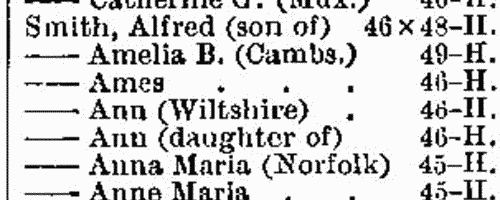
| Missing Next-of-Kin and Heirs-at-Law
(1900)
The Unclaimed Money Registry and Next-of-Kin Advertisement Office of F. H. Dougal & Co., on the Strand in London, published a comprehensive 'Index to Advertisements for Next of Kin, Heirs at Law, Legatees, &c., &c., who have been Advertised for to Claim Money and Property in Great Britain and all Parts of the World; also Annuitants, Shareholders, Intestates, Testators, Missing Friends, Creditors or their Representatives, Claimants, Unclaimed and Reclaimed Dividends and Stock, Citations, Administrations, Rewards for Certificates, Wills, Advertisements, &c., Claims, Unclaimed Balances, Packages, Addresses, Parish Clerks' Notices, Foreign Intestates, &c., &c.' The original list was compiled about 1880, but from materials dating back even into the 18th century: most of the references belong to 1850 to 1880. For each entry only a name is given, sometimes with a placename added in brackets: there may be a reference number, but there is no key by which the original advertisement may be traced. The enquirer of the time had to remit £1 for a 'Full and Authentic Copy of the Original Advertisement, together with name and date of newspaper in which the same appeared'. This appendix to the list was issued in about 1900.TRAPPE. Cost: £4.00.  | Sample scan, click to enlarge
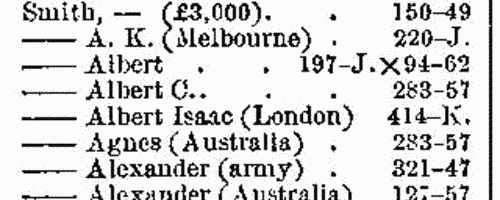
| Members Joining the Cyclists' Touring Club: Middlesex
(1927)
Each month in the Cyclists' Touring Club Gazette was printed a list of candidates for membership, area by area, giving surname, initial(s), and full postal address. (F.) indicates that the candidate was joining the club under the Family Membership Scheme; (J.) joining under the Juvenile Membership Scheme. TRAPPE. Cost: £6.00.  | Sample scan, click to enlarge

| Chemists
(1950)
The Royal Institute of Chemistry was founded in 1877, and was open only to British subjects (and also, in due course, to citizens of the newly-created Republic of Ireland). Associates of the institute (A. R. I. C.) qualified either by studying chemistry, physics, mathematics and an optional science for the institute's examination (which insisted on a high standard of practical laboratory efficiency); or by obtaining good honours degrees or equivalent qualifications, with chemistry as principal subject, and having undergone training in allied sciences. Associates of at least three years' standing could then be admitted to the Fellowship (F. R. I. C.) either by taking a further examination in a special branch of chemistry, or by submitting the results of work or evidence of experience sufficient to justify the Council in granting exemption from such further examination. This register of fellows and associates, correct to 31 August 1950, contains 11,545 names, arranged alphabetically, surname first (in capitals), with qualifications, current address, telephone number, and (in italics) a brief description of present post in the chemical industry. Finally, year of admission as associate (A.) (and, where appropriate, fellow (F.) is given on the right-hand side. With this may appear the notation (x) for a fellow of the Chemical Society, (y) for a member of the Society of Chemical Industry, or (z) for a joint subscriber to all three chartered bodies.TRAPPE. Cost: £4.00.  | Sample scan, click to enlarge
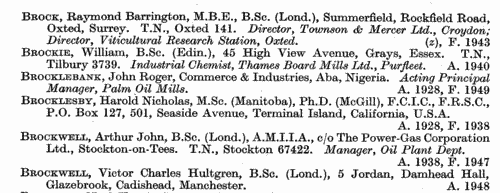
|
Research your ancestry, family history, genealogy and one-name study by direct access to original records and archives indexed by surname.
|













